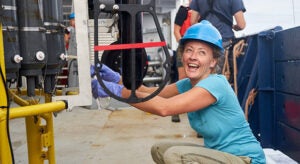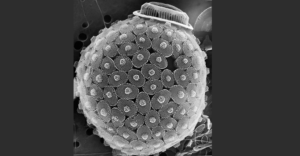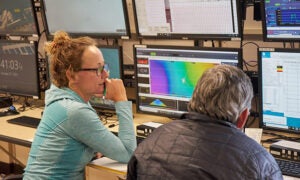A Giant Effort for Tiny Marine Plankton

BIOS research specialist Becky Garley worked on board the research vessel Roger Revelle during a cruise out of Hawaii this winter to the central Southern Ocean between New Zealand and South America, “about as far from land as you can get,” she said. She worked 12 hour shifts each day collecting water samples at a variety of depths to study coccolithophores, microscopic shell-building plankton that live in huge numbers throughout the ocean. Photo by Giuliana Viglione.
The quest to understand a very small, yet critically important, part of the marine food web proved especially challenging this spring during the ongoing global health pandemic. For participating scientists and university students, the process started in December 2020 with a 14-day quarantine period in Hawaii, where they were prohibited from leaving their hotel rooms, even for a walk. Then there were five COVID-19 tests for each (all negative). Next came days of sea travel past the Tahitian Islands and the Equator, with all 39 people on board the research vessel Roger Revelle wearing masks and trying to stay socially distant for the first two weeks of the trip (as much as possible on a 277-foot ship).
Finally, the ship reached the central Southern Ocean between New Zealand and South America, “about as far from land as you can get,” said BIOS research specialist Becky Garley. Then they could start their study of coccolithophores, microscopic shell-building plankton that live in huge numbers throughout the ocean.
Coccolithophores, which play a large role in the marine food web, are of particular interest to those studying global climate change. As ocean acidity increases, their outer shells, called coccoliths, may become even more important as a carbon sink, or reservoir, for carbon-containing chemical compounds.

Under 17,500-times magnification, an image of the coccolithophore Syracosphaera mediterranea collected in the waters off Bermuda clearly shows its calcite coccoliths. These delicate structures make the organisms more susceptible to ocean acidification, as a lower pH can dissolve existing coccoliths and make it difficult for the coccolithophores to build new ones. (The “hat” visible on this coccolithophore likely landed on it from another species). Photo credit: Amos Winter, Indiana State University.
The quest to understand a very small, yet critically important, part of the marine food web proved especially challenging this spring during the ongoing global health pandemic. For participating scientists and university students, the process started in December 2020 with a 14-day quarantine period in Hawaii, where they were prohibited from leaving their hotel rooms, even for a walk. Then there were five COVID-19 tests for each (all negative). Next came days of sea travel past the Tahitian Islands and the Equator, with all 39 people on board the research vessel Roger Revelle wearing masks and trying to stay socially distant for the first two weeks of the trip (as much as possible on a 277-foot ship).
Finally, the ship reached the central Southern Ocean between New Zealand and South America, “about as far from land as you can get,” said BIOS research specialist Becky Garley. Then they could start their study of coccolithophores, microscopic shell-building plankton that live in huge numbers throughout the ocean.
Coccolithophores, which play a large role in the marine food web, are of particular interest to those studying global climate change. As ocean acidity increases, their outer shells, called coccoliths, may become even more important as a carbon sink, or reservoir, for carbon-containing chemical compounds.

Garley (left) and the expedition’s chief scientist, biological oceanographer Barney Balch of the Bigelow Laboratory for Ocean Sciences in Maine, gathered in the ship’s computer lab while the crew ran a CTD cast on deck. The monitors showed the cast profile, and allowed them to see and select depths for remotely closing bottles on the CTD rosette. The collected water samples at different depths provide a complete cast profile. Photo by Giuliana Viglione.
Twelve-Hour Shifts
Garley– who works with Bates and has participated on cruises to the Southern Ocean in 2011, 2012, and again this spring–worked a 12 hour shift every 2 a.m. to 2 p.m. while on the ship. (Her BIOS colleague, research specialist Matt Enright, worked the other 12 hours.) To sample continuously for carbonate chemistry in seawater at 12 different depths, ranging from surface waters to depths up to 19,000 feet (6,000 meters), they relied on an instrument called a CTD, used to collect measurements of conductivity (a measure of salinity), temperature, and depth.
They also analyzed surface seawater samples using the ship’s underway surface sampling equipment, which collects water every 20 to 30 minutes to measure acidity, carbon dioxide, and alkalinity. The ship’s system also collected a huge amount of data related to currents, bathymetric (or depth) measurements, meteorological data, and surface water properties, including temperature, salinity, fluorescence, and oxygen, which will be processed and studied in the months ahead.
When the samples arrive back at BIOS this spring after shipment from Hawaii, they will be re-processed for quality control checks, entered into data sheets, then combined with other lab groups’ biogeochemical data as a means to understand Southern Ocean ecosystem dynamics.
This research cruise was part of a collaborative National Science Foundation award to BIOS scientist Nicholas Bates and colleagues, including lead scientist Barney Balch (Bigelow Laboratory of Ocean Sciences), Dennis McGillicuddy (Woods Hole Oceanographic Institution), Peter Morton (Florida State University), and Matthew Long (National Center for Atmospheric Research/University Corporation for Atmospheric Research).
